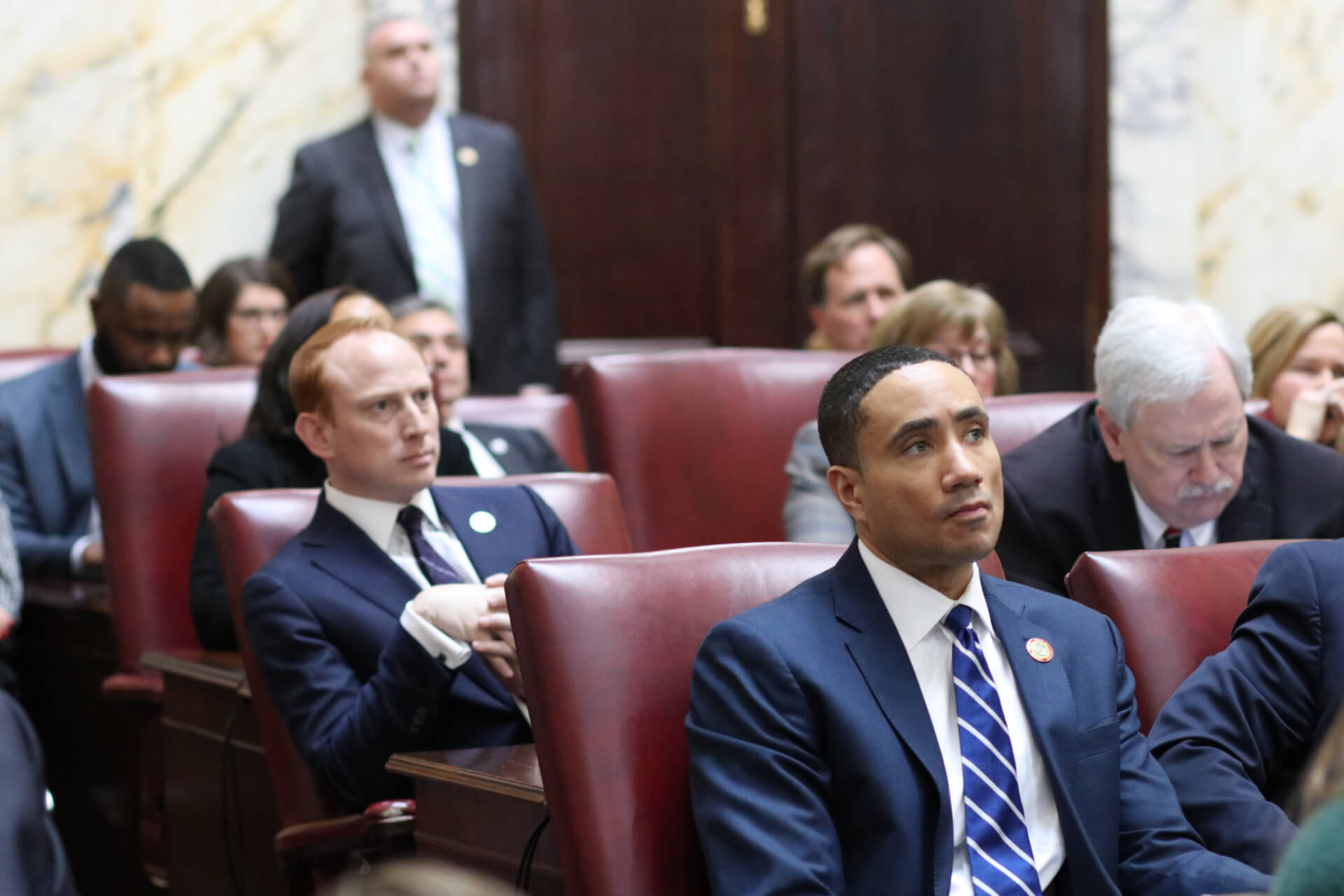Senate Panel Votes Out Jones’ Police Reform Package, Fears for the Fate of Its Own Bills

After nearly eight-and-a-half hours of contentious debate and over a dozen attempts to amend it, the House Police Accountability Act of 2021 moved out of the Senate Judicial Proceedings Committee late Tuesday night.
The bill, sponsored by House Speaker Adrienne A. Jones (D-Baltimore County), passed on a party-line vote of 7-4.
But the mood was solemn in the Senate committee. Republicans on the panel were especially critical of the legislation and the process.
“I think we were destined to have a failing product from the beginning,” Senate Minority Whip Michael J. Hough (R-Frederick) said before casting his final vote on the bill Tuesday night. “Both chambers didn’t start with similar legislation; neither chamber conferenced it; we’re taking the House bill in one day and trying to rewrite it and their process is very flawed.”
In early March, the Senate Judicial Proceedings committee passed a package of nine police reform bills over to the House chamber. Most measures had bipartisan support.
“I was so proud of the bipartisan bills to be passed in the Senate a month ago that this morning I sent a very lengthy email to everybody on my list, proudly talking about how we had achieved a bipartisan consensus and the Maryland State Senate was working in exactly the way that people should expect us to work,” Sen. Christopher R. West (R-Baltimore County) said Tuesday night. “Now I’m going to have to send out another email saying I was too early or premature because everything seems to have collapsed.”
Some committee members struggled with different aspects of Jones’ wide-ranging, comprehensive bill, saying it does away with its original intent to root out bad officers.
“The nine bills that the Senate worked arduously over, and we had to painfully re-litigate tonight, and members had to painfully re-vote and re-litigate line-after-line … this whole process, I feel, is just going to be taken over by the House,” Hough said.
The House Judiciary Committee held bill hearings for the Senate police reform package last week.
Asked in a text message if or when the committee planned to vote on the Senate bills, Alexandra M. Hughes, Jones’ chief of staff, told Maryland Matters “soon.”
As the explanations of senators’ votes went on Tuesday night, Senate Judicial Proceedings Committee Chairman William C. Smith Jr. (D-Montgomery) appeared to grow more and more exhausted: He rested his feet on the edge of his desk, drawing his knees close to his chest; his hand clung to his brow as if it were magnetized, and he paused every few minutes to take a deep, deliberate breath.
Once the final vote was called, he gaveled the meeting out and quickly disappeared.
The rhetoric in the committee room from Republican members was focused on politics, winning and losing.
“What’s happened today represents the capitulation of the Maryland State Senate to the Maryland House of Delegates,” West said before the bill’s final vote. “Clearly, they’ve won, and I have no confidence that they will treat the other bills that we produce any more fairly than this bill.”
“It’s a shame that the two institutions have not figured out how to work together,” he continued. “But rather, because the Speaker of the House has indicated this bill is her baby, the Senate feels like we have to lie down and let her roll over us.”
At one point, Sen. Robert G. Cassilly (R-Harford) complained about Democrats on the committee voting in favor of the bill, despite their complaints about a lack of clarity surrounding measures in the legislation.
“It’s like ‘no, we’re not going to change this because Adrienne says that’s the law, so that’s the law,'” Cassilly said. “It feels like we’re voting just to vote.”
That prompted Hughes and House Judiciary Committee Vice Chair Vanessa E. Atterbeary (D-Howard) to jump to the House speaker’s defense. Both tweeted that Cassilly should “show some respect.”
Show some respect please.
Her name is Speaker or Madame Speaker to you.
— Alex Hughes (@amhinannapolis) March 30, 2021
SHOW SOME RESPECT. IT'S "MADAME SPEAKER." https://t.co/KPR4ZjhITf pic.twitter.com/Ptv3Lp7cpk
— Vanessa Atterbeary (@VAtterbeary) March 31, 2021
Committee Republicans made several attempts to remove portions of the wide-ranging legislation that hadn’t been discussed in the nine reform bills that passed through their own committee, taking swipes at measures to increase the liability cap that victims of police brutality can seek for damages, limit civilian ability to lawfully record police stops and strike portions of the bill that would require current and prospective officers to undergo implicit bias testing and annual mental health assessments.
All of these failed.
Cassilly attempted to amend a provision of the bill that would strip officers of their pension as a penalty for criminal offenses that took place during the course of their job.
“I don’t know any other state employment position where somebody can go through a 27-, 28-year career, mess up in their 30th year and then forfeit all their retirement,” he said.
Phillip Anthony, counsel to the Senate Budget and Taxation’s Pensions Subcommittee, told lawmakers that the provisions in these amendments are modeled off of existing language in the state pension code that apply to constitutional officers, including legislators, the state treasurer, the attorney general, the comptroller, the secretary of state, the lieutenant governor and the governor.
Anthony said that the bill’s language provides protections for spouses and dependents of police officers.
Sen. Jack Bailey (R-St. Mary’s) asked the committee to consider what they were doing before they voted on this amendment.
“We talked about taking police officers’ pensions away from them,” said Bailey, a former officer for the Department of Natural Resources. “And I just want to make everyone [is] aware that what we’re talking about is women and men who are prepared to give the ultimate sacrifice for each and every one of us, every day.”
Sen. Michael A. Jackson (D-Prince George’s), who has frequently served as a swing vote as the committee debated police reform legislation this session, struggled to decide how to side on Cassilly’s amendment.
“I just think we’re going a little too far, folks,” the former Prince George’s County sheriff told his colleagues as he voted for it. “There are other ways to bring about accountability. There really are.”
Regardless, Cassilly’s motion to strike the pension measure failed 5-6.
The committee did successfully amend the bill, including adopting measures to:
- Change the composition of the police accountability boards, administrative charging committees and trial boards afforded under the bill;
- Give more oversight responsibilities to local police accountability boards; and
- Allow records to be expunged if officers were exonerated, the charges against them were unsustained or they were acquitted and three years have passed since final disposition.
The bill is expected to reach the Senate floor this week.
Click here to read reporter Hannah Gaskill’s Twitter thread of the Senate Judicial Proceedings Committee voting session Tuesday night.





 Creative Commons Attribution
Creative Commons Attribution